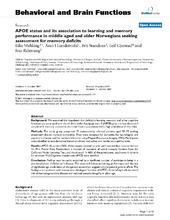APOE status and its association to learning and memory performance in middle aged and older Norwegians seeking assessment for memory deficits
Peer reviewed, Journal article
Permanent lenke
https://hdl.handle.net/1956/2679Utgivelsesdato
2007-10-31Metadata
Vis full innførselSamlinger
Originalversjon
https://doi.org/10.1186/1744-9081-3-57Sammendrag
Background: We examined the hypothesis that deficits in learning, memory, and other cognitive functions are associated with the ε4 allele of the Apolipoprotein E (APOE) gene in a non-demented sample with memory complaints recruited from a population with a high prevalence of this allele. Methods: The study group comprised 70 consecutively referred patients aged 50–75 seeking assessment due to memory complaints. They were screened for dementia, for neurological and psychiatric disease, and for cerebral infarction using Magnet Resonance Imaging (MRI). Participants were classified as non-demented based on clinical evaluation and results on cognitive tests. Results: APOE ε4 carriers (56% of the sample) showed poorer performance than non-carriers on the Mini Mental State Examination, a number of measures of verbal memory function from the California Verbal Learning Test, and visual recall. In 46% of the participants, psychometric criteria for amnestic Mild Cognitive Impairment (aMCI) were satisfied. Conclusion: Findings may be partly explained by a significant number of participants being in a preclinical phase of Alzheimer's disease. The observed deficits in learning performance and the lack of significant age modulation of the genetic association suggest a more general genetic effect. The findings are consistent with known neurobiological function of APOE ε4, including both increased risk of neurodegenerative disease and reduced synaptic integrity in older age.
